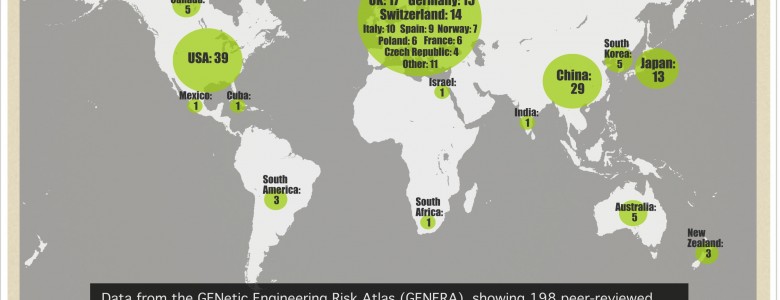In August, we launched the Beta release of the GENetic Engineering Risk Atlas (GENERA). This is our long-term project to make it easier to find and understand the scientific literature on genetically engineered crops. When we released the beta version of GENERA we knew there was still a lot of work to be done, including adding and correcting citation information, funding, and outcomes for studies. We also got some feedback on its functionality (please take our survey!) and we are planning the next big update to occur in January. For this update, there is one section that we would like your help to build: links to outside analyses. Read more »
Tamar Haspel wrote a thoughtful and in-depth article about patents and genetically engineered crops for the Washington Post. One of the questions that often comes up is whether patents are preventing independent research from being conducted on these crops? To help answer the question, Haspel included a description of GENERA!
Monsanto has agreements with more than 100 universities that allow academic scientists to do independent research with no oversight (although those agreements don’t cover plant breeding). That’s one reason why, despite what you might have heard, there have been hundreds of independent studies on genetically engineered organisms. Biology Fortified, an independent nonprofit organization, is cataloging GMO research and is 400 studies into a database that eventually will hold more than 1,000. The database, GENERA, shows that, of those 400, more than half report receiving no industry funding.
We are happy to see this resource being used by journalists, and we hope that it will help people find out more about what science has been done on genetically engineered crops. Read the whole article here.
Marc Brazeau wrote an article about GENERA for Cosmos Magazine. Here is a teaser:
GM food is safe according to independent studies
Not-for-profit group Biology Fortified is dedicated to dispelling myths about genetically modified crops. Marc Brazeau reports.
Critics of genetically modified crops often assert that all research into the plants’ safety is bought and paid for by industry. Not so, according to a newly compiled database of biotech crop research. Independently funded, peer-reviewed research into GM crops “is common, conducted worldwide, and makes up half of the total research on risk associated with genetic engineering,” say the team behind the database.

The Genetic Literacy Project, a great source of information about genetics and biotechnology from plants to humans, has made infographics based on the preliminary data from GENERA. They wanted to answer the question: Where is the government-funded research happening, and are GMOs safe? (And does the funding source for the study matter for the conclusion?) Take a look at these and see! Feel free to share them with people, print them out, etc. The PDF files have links to help people find each site. Read more »
The GENetic Engineering Risk Atlas is proud to announce the launch of our website and the public beta test of our system. Today, for the first time ever, the public will be able to see what we have been working on for so long. Check out our press release and let us know what you think about the new GENetic Engineering Risk Atlas!
New resource shows half of GMO research is independent
Those who follow the issue of genetically engineered crops have heard claims that there is little independent research on their safety for consumption or the environment. A new public database of research tells a different story. The resource is the GENetic Engineering Risk Atlas (GENERA), and it goes public on 25 August 2014. The results show that independent peer-reviewed research on GMOs is common, conducted worldwide, and makes up half of the total of all research on risks associated with genetic engineering. Read more »
